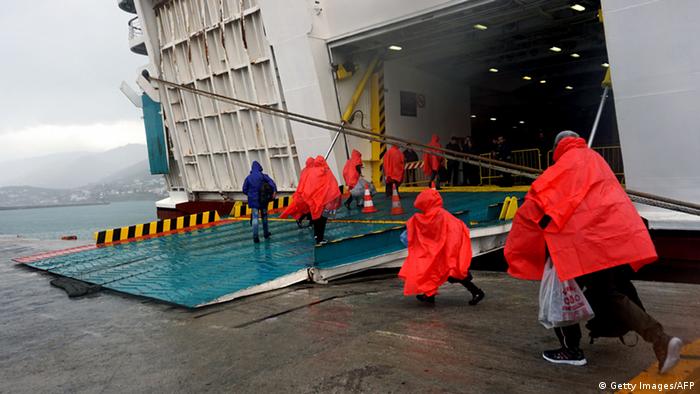MIGRATION
Greece starts evacuation of Lesbos refugees
Ferries have begun the process of removing 6,000 refugees from Greek islands to the mainland, German media reports. The evacuation follows Friday's repatriation deal between the EU and Turkey.
Germany's "Frankfurter Allgemeine Sonntagszeitung (FAS) reported on Saturday evening that the Greek army had begun to evacuate refugees staying in temporary camps on eastern islands in the Aegean Sea to the mainland.
The newspaper says the removal appears to have begun before the rules of EU's agreement with Turkey officially come into force on Sunday.
DW's correspondent Jaafar Abdul Karim tweeted a video saying that all camps on the Greek islands would be evacuated within 24 hours. Several hundreds refugees are expected to board one of the first ferries to Kavala on the northern Greek mainland.
Karim described a state of confusion among the refugees about what would happen to them.
Another DW correspondent, Verica Spasovska, also tweeted that refugees in Lesbos were about to board the ferry for Kavala.
Newly arrived refugees would still have to remain on the islands until their registration is complete, officials said.
EU teams to assist
The Greek conservative newspaper "Kathimerini" said that the EU promised Greek Prime Minister Alexis Tsipras that Brussels would send 2,300 security and legal experts to assist in the evacuation. The first are expected to arrive this weekend.
Germany and France have promised to send up to 300 officials to assist, the German news agency DPA reported, citing a letter from German Interior Minister Thomas de Maiziere and his French counterpart Bernard Cazeneuve to the European Commission.
In addition, Germany and France are expected to offer "technical expertise" to support Athens in the repatriation process.
"This is necessary in view of the current situation in Greece and is an important expression of European solidarity," the pair wrote. "We hope that many Member States will join our example."
Controversial deal
Under the deal agreed on Friday between the EU and Turkey, for every Syrian refugee that is returned to Turkey, the EU will resettle one refugee directly from Turkey.
The aim is to stop migrants from making the perilous trip across the Aegean Sea, where around 4,000 people have drowned over the past few years.
The actual return of migrants to Turkey will begin from April 4, German Chancellor Angela Merkel said.
Greece struggles to cope
Greek officials say more than 47,000 undocumented migrants are in the country. In March alone, more than 21,000 people arrived, according to figures from the United Nations refugee angency (UNHCR).
In recent days, the number of arrivals have increased again. One Greek Coast Guard suggested that migrants may fear the door to Europe is being closed by the signing of the EU-Turkey deal on Friday.
"They want, whatever it costs, to get to Greece and therefore the EU," said the officer on the island of Chios.
A tense situation remains in the makeshift Idomeni refugee camp close to the Greek border with Macedonia.
"We are worried that it could lead to violence or even to a storming of the Macedonian border fence, " a police office from the provincial capital Kilkis told DPA.
The Greek crisis unit estimates that around 10,500 people remain in Idomeni after the so-called Balkan route to northern Europe was blocked.
mnm/bw (dpa, AFP, fas)

No comments:
Post a Comment